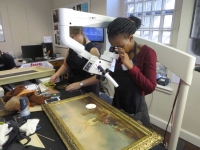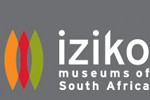
The visual university: an exploration into ways of seeing (optional)
20 March-2 April, 2015
Convener: Nina Liebenberg
Our lives are dominated by images and by visual technologies that allow for the local and global circulation of ideas, information, and politics. This workshop will examine how we see paintings, prints, photographs, film, television, advertisements, the news, the Internet, digital media, and visualisation techniques in medicine and science. Interdisciplinary bridges between art history, film, media, and cultural studies will investigate how images carry meaning within and between different cultural arenas in everyday life, from art and commerce to science and the law – in relation to a wide spectrum of cultural and representational issues (desire, power, the gaze and ethnicity) and methodologies (semiotics, Marxism, psychoanalysis, feminism, and postcolonial theory).
Combining theory and practice, students will attend morning sessions by a variety of specialists on sight, and attend practical sessions in the afternoon exploring the rich visual depository of objects and images in the university: astronomical images across the electromagnetic spectrum allowing the study of galactic phenomena not possible by other means; the diagnosis of disease dependent on X-ray images, CAT scans and mammograms; the magnified images of grains of rock aiding the construction or reliable mathematical models; various forms of mapping which are central to picturing both vast areas of land and revealing its history; and visual rhetoric as a growing field of criminal law.
These practical sessions will culminate in a small exhibition curated by participating students.
Preventive conservation (compulsory)
1-5 June, 2015
Conveners: Hayden Proud, curator and Angela Zehnder, conservator, Iziko South African National Gallery
This workshop will be hosted at the Iziko South African National Gallery.

Contemporary Issues in Art Conservation (compulsory)
13 -17 July, 2015
Instructor: Sanchita Balachandran
Convener: Angela Zehnder, painting conservator, Iziko South African National Gallery
Workshop arranged and held at the Iziko South African National Gallery.



Watch Ms Balanchandran’s talk ‘Teaching at the University Museum’
The students and Ms Balanchandran collaborated in creating a blog, The Thinking Conservator, in an attempt to create an interactive lasting archive of this workshop. See their blog here.
Being Africa: Narratives of Contextualizations of Artistic Environments (compulsory)
September, 2015
Instructor: Kuyo Kouoh (see more on Kouoh, this years visiting scholar, below)
Since the 1990s the visual arts field has undergone a fast pace internationalization, which has to a large extent followed the geopolitical routes of increased deterritorialization of markets, education and production of knowledge. While in the West there has been a concording flow of government as well as philanthropic funds in aid of international exchange in this field, close to nothing of such character can be deciphered in African cultural policies. This reality naturally leads to questioning to what extent the non-existense of transnational visions for cultural and artistic production undermines the production, representation and validation of artistic and intellectual practice.
Contemporary artistic practice is strongly linked to the notion of being international and the perceived necessity to operate within a given range of aesthetic, political and discursive languages. This “globalism” brings to the fore practices and behaviors as well as international protagonists, who with an ease of mobility and intellectual skillfulness are able to translate culture for an international audience. The workshop will discuss the contextualization of African artistic environments through the various trajectories of independent art spaces that emerged on the continent since the 1990s. We will explore the intellectual and political premises at the root of these initiatives as well as how artists, curators, critics and thinkers at large create ways in which artistic and institutional practices work with issues of difference, solidarity and criticality.
In counter distinction to the lack of effective national programs for the support, representation and preservation de-aligned from market driven forces and block-buster events, the workshop intends to look at different independent commitments to initiating autonomous systems where the conditions for production and dissemination are self-organised to a high degree, and at the same time are linked to progressive international flows of ideas and artistic practices. These alternative models of making sense of what art can contribute to the construction of societies serve as examples of self institutionalization by artists and curators. We will discuss the strategic negotiations they offer to state bodies in relation to their own sustainability and organizational principles.
Workshop breakdown:
Day 1:
Contemporary African Art, the establishment of a canon
Day 2:
Fruitful conversations, strategic negotiations with state bodies
Day 3:
Filling the Voids, the emergence of independent art spaces

Besides a sustained theoretical, exhibition, and residency program at RAW Material Company, she maintains critical curatorial, advisory and judging activity internationally. In collaboration with Rasha Salti, Kouoh is working on Saving Bruce Lee: African and Arab Cinema in the Era of Soviet Cultural Diplomacy, a three-year research, exhibition and publication project to be held at Garage Museum of Contemporary Art in in 2017. She lives and works in Dakar and Basel.
Header image (repeated under Contemporary Issues in Art Conservation workshop) of Sanchita Balachandran and students, photographed by Will Kirk of Homewood Photography, Johns Hopkins University